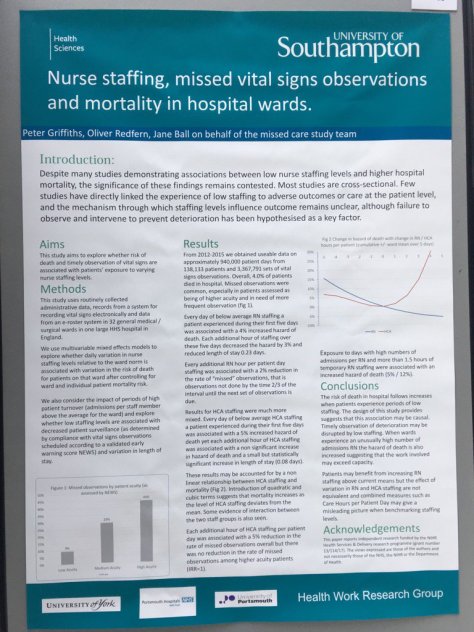
It was palpable with research geekery excitement while travelling to Nottingham for the 2017 Health Services Research UK Conference. I needed this, I thought, an opportunity for positivity, to talk enthusiastically about how we as researchers can help sustain the future of the NHS and wider health services. The conference didn’t disappoint.
We are all too aware of the popular rhetoric that consumes newsfeeds and social media channels, with headlines like ‘The NHS is in Crisis’ and ‘too many people are pitching up to A&E’. All doom and gloom. The conference was a perfect antidote to this. While there are no panaceas to these ongoing issues, my fellow health services researchers offered positivity and direction against the troubling backdrop of public service austerity and Brexit uncertainty.

The opening plenary ‘A Brief History of NHS Politics’ by Professor Martin Roland, Emeritus Professor of Health Services Research at the University of Cambridge, reminded us that the challenges facing the NHS were present at its inception. We are not in new ground. Quoting Aneurin Bevan ‘Most NHS shortcomings are defects but [reflective of] overwhelming volume of need…vast amount of suffering’, it served as a powerful reminder that while there are challenges, we must continue to overcome them and health services research has an important role to play.
Often facing most strain are the healthcare professionals that work tremendously hard to ensure health services operate as best they can for the public. With this in mind I was drawn to the papers in the ‘Workforce’ sessions. Colleagues Jane Ball and Peter Griffiths at the University of Southampton, presented articulate papers around post-op mortality, missed care, and nurse staffing.

Rob Anderson at Exeter University also provided an excellent overview of UK empirical evidence outlining why GPs leave direct patient care. We learnt that healthcare professionals face not only structural issues around staff levels, restricted budgets, and service reorganisation, but also a growing population, who are living longer and presenting with more complex health needs. This creates a perfect storm for workload stress, lack of work life balance and overall job dissatisfaction.
The policy implications from these papers struck me most. Any policy interventions need to understand the complex environment facing healthcare professionals, a one size fits all, raft of measures and tools, will not work. Policy must be evidenced based, moving beyond numbers, and used prior to policy announcement. Not cherry picked to suit a pre-existing policy concept.
The workforce sessions were well balanced with an interactive workshop ‘The legacy of Midstaffs’, with academics and a practitioner panel comprising a chief executive, chair, medical director, director of risk and safety, and a patient voice. They provided comment and led the discussion on learning and the implications for our understanding about successful policy generation and implementation. Colleagues Naomi Chambers and Kieran Walshe, from the University of Manchester, offered insightful studies around the legacy of Midstaffs policy and the importance of making sure lessons are learnt to deliver safe and better services.

It was the patient voice, however, that moved me most. He offered a simple yet poignant question ‘What difference does our work as academics make for patients?’ and this was my light bulb moment.
Not only are healthcare services researchers academics; we are ‘academic citizens’ too. We have both a professional and arguably moral obligation to use our findings to influence public policy. We have the autonomy to reach deeper and more meaningful insights of not only what the public needs but also what our providers need to ensure everyone has equality of healthcare.
I’ll definitely be back next year, I’m off now to practice being a better ‘academic citizen’ – I hope you are too.


This is really a good topic about how Health research can be important in the provision of health services. Here is the Link to my Blog where you can get more other information about global health. https://healthinfo.home.blog/blog/
LikeLiked by 1 person